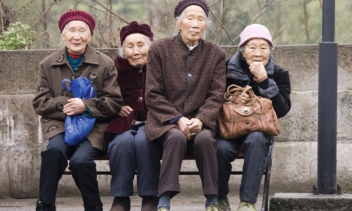You wait to read a news story about global ageing for weeks and then they all come at once!
It’s been a busy week for those of us who trawl through the global media looking for stories about ageing. Usually, it’s not a particularly fruitful search. Stories tend to be about things like how global ageing populations are spurring the markets for cat food or how technology such as personal helper robots in Japan are the solution to a rapidly ageing population.
Well, not quite. But suddenly the media has discovered that global ageing is a story worth telling.
Old-age tension
 On 7 October a new report “Global Ageing 2010: An Irreversible Truth”, was released by Standard & Poor, a ratings agency. It stated that as people retire over the next two decades, the burden on states will rise sharply.
On 7 October a new report “Global Ageing 2010: An Irreversible Truth”, was released by Standard & Poor, a ratings agency. It stated that as people retire over the next two decades, the burden on states will rise sharply.
Spending on pensions, health care and long-term care (i.e. nursing homes) will rise. The report warns that, if policies do not change, six European countries – Belgium, France, Greece, Luxembourg, Slovenia and Ukraine – will be devoting more than 30% of their GDP to age-related spending by 2050.
The New York Times picked up the story, as did the Economist in Old-age tension. However, most of these reports are based on research that doesn’t include the poorest countries of the world. It didn’t mention that 80% of the world’s population has no income security in older age and many people in developing countries continue to work well into older age to support themselves and their families.
Nor did it highlight that universal non-contributory pensions in most developing countries would cost less than 1.5% of the GDP and the experience of countries like Brazil, South Africa, Nepal and Bolivia shows it is an effective way of cutting poverty of both older people and their families. Instead, it focused on the huge burden older people are going to be in the future. Nothing new then.
“Gray tsunami”
 However, a more interesting article appeared in Foreign Policy Magazine. Here, Philip Longman warns of a “gray tsunami sweeping the planet” and argues that “a gray world will be a poorer world” if we do nothing to prepare for these massive demographic changes. He suggests that there may be a way to prepare for this but that we “aren’t quite sure how to get there”. He goes on to say that “the society that figures out how to restore the economic foundation of the family will own the future”.
However, a more interesting article appeared in Foreign Policy Magazine. Here, Philip Longman warns of a “gray tsunami sweeping the planet” and argues that “a gray world will be a poorer world” if we do nothing to prepare for these massive demographic changes. He suggests that there may be a way to prepare for this but that we “aren’t quite sure how to get there”. He goes on to say that “the society that figures out how to restore the economic foundation of the family will own the future”.
It was accompanied by a wonderful photogallery with some killer statistics and facts!
Mark Gorman as a guest on Duncan Green’s From Poverty to Power Oxfam blog offers more in-depth answers to the question raised by Longman.
Older people are a benefit, not a burden
Lastly, an interesting story from Zambia: Can the World’s Ageing Population benefit Africa?
Our HelpAge colleague Gacheru Mainu has commented on this site, saying: “Africa has a younger population and this demographic is growing larger by the day, but the economic impact of the older generation in Africa is greatly understated.
“A quick glance across the African continent points to a huge number of older people looking after orphaned and vulnerable children impacted by HIV and AIDS. The continent needs to put effective policies and measures in place to ensure that if the younger demographic goes to work elsewhere, the older people left behind will continue to contribute to society and the economy, through forms of livelihoods and social pensions.”
Visit HelpAge’s newsroom to find press releases, features, life stories and photos.
